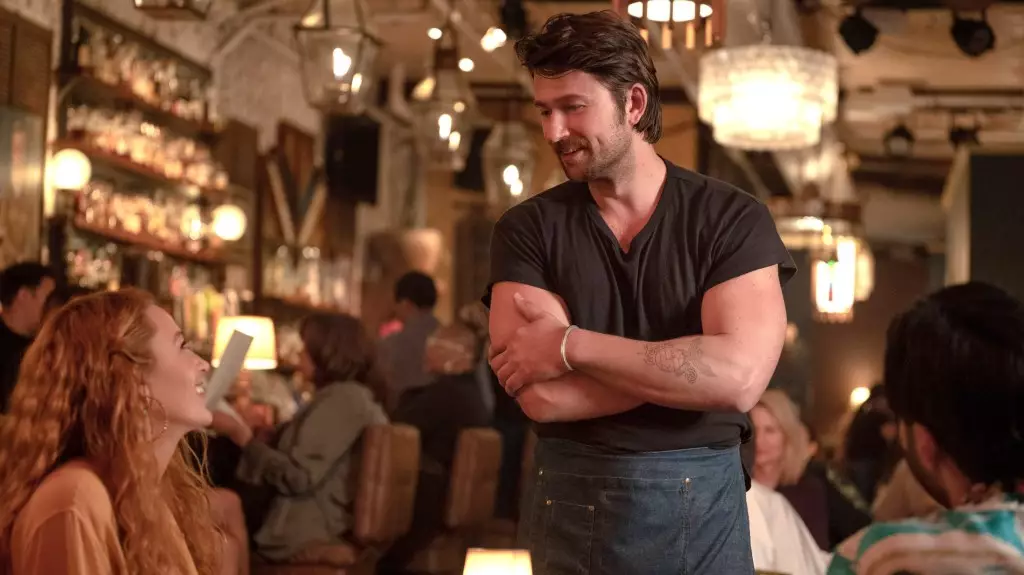The recent allegations against director and star Justin Baldoni have sent ripples through the film industry, sparking a crucial discourse surrounding workplace conduct, especially in Hollywood. Following Blake Lively’s filing of a lengthy complaint detailing instances of sexual harassment, co-star Brandon Sklenar passionately urged his followers to absorb the gravity of the situation. Sklenar, who plays a significant role in the film adaptation of Colleen Hoover’s novel “It Ends With Us,” took to his Instagram to share the complaint, highlighting not only the emotional weight of Lively’s experiences but also the urgent need for systemic change in the industry.
The social media response to Lively’s allegations has been profound. Sklenar’s call to action, punctuated with heartfelt emotion, resonated with many in Hollywood and beyond. By tagging Lively in his post, he not only expressed support but also encouraged a broader audience to engage in the narrative unfolding around these serious accusations. The fallout has seen a chorus of support from various figures in Hollywood, including cast members from Lively’s previous projects, and influential personalities such as Gwyneth Paltrow and Amy Schumer. Their collective voices amplify the importance of addressing workplace harassment and highlight the cultural shift that is desperately needed.
This moment of solidarity among colleagues also serves to remind audiences of the complexities faced by women in the entertainment industry. The rapid support for Lively stands in stark contrast to the media frenzy that often sensationalizes women’s stories while simultaneously neglecting their truths. Such support might not only empower other victims to come forward but could also initiate conversations that lead to meaningful industry reforms.
The 80-page complaint filed by Lively outlines a series of alleged misconduct by Baldoni, painting a picture of a toxic work environment. From claims of unsolicited physical behavior to the insensitivity demonstrated during intimate filming scenes, the complaint describes actions that, if true, illustrate a serious breach of respect and professionalism. Lively recounts incidents where Baldoni is said to have engaged in inappropriate behavior—improvised kissing scenes, lewd remarks, and uninvited invasions of privacy. Each of these allegations adds layers to understanding the challenges faced by individuals like Lively, who strive to advocate for their rights amidst an often hostile work atmosphere.
Beyond her personal confrontations with Baldoni, the complaint points to a larger issue involving a purported smear campaign aimed at discrediting Lively following her disclosures. This part of the narrative shines a light on the protective instincts that often perpetuate silence within the industry—a tactic that undermines victims and frequently leaves them without recourse.
The immediate consequences of Lively’s claims have been significant. The swift removal of Baldoni from agency WME illustrates the seriousness with which such allegations are taken in the industry. Additionally, Liz Plank’s resignation from Baldoni’s podcast “Man Enough” signifies the awakening of others to their moral responsibilities in the face of misconduct allegations. This cascade of events reveals not just a personal struggle for a few individuals but indicates a crucial reckoning for the industry as a whole.
The Voices of Solidarity Award given to Baldoni, rescinded within a mere few weeks of its bestowal, exemplifies the industry’s shifting dynamics as it grapples with accountability. As accusations become more publicly scrutinized, the question arises: how much longer can such behaviors be tolerated?
The unfolding drama surrounding Blake Lively and Justin Baldoni is not merely a scandal to be dissected for entertainment; it is a reflection of a larger conversation about respect, consent, and empowerment in Hollywood. The vibrant discussions ignited by Lively’s bravery in speaking out serve as a clarion call for change in an industry fraught with challenges for women. As celebrities rally around Lively, they lend their voices to a message of hope and resilience, encouraging a future where stories of empowerment dominate and where every individual can feel safe in their workspace.
Ultimately, this moment transcends the confines of a single incident; it is an opportunity for deep reflection and systemic improvement, for the reverberations of these events will be felt far beyond Hollywood, impacting countless lives and careers in the process.

